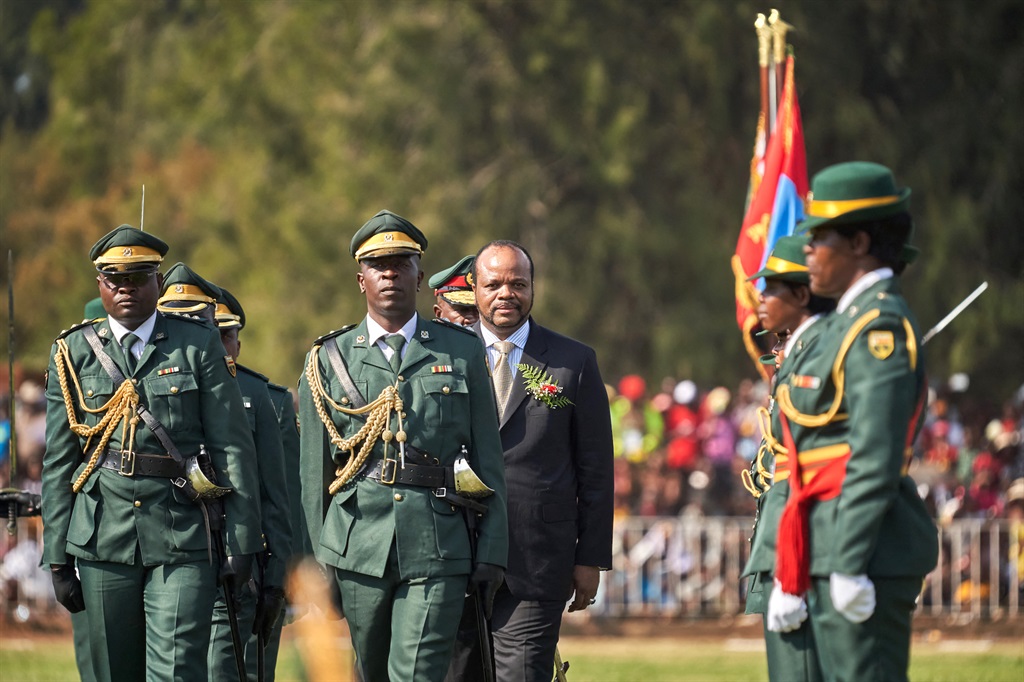

- Eswatini turned 55 on Wednesday.
- Taiwan was a prominent attendee at the celebrations.
- Eswatini’s government says the country’s development is worthy of celebration but civil society activists don’t quite agree.
Fresh from the Umhlanga Reed Dance, Eswatini will on Wednesday commemorate what it termed “55/55 double celebrations”, combining independence celebrations with the birthday of the last absolute monarch in Africa, King Mswati III.
The Reed Dance is a five-day event where young women and unmarried girls are assembled to cut reeds for the yearly repairs to the windbreaks of the queen mother’s village.
Some of the notable guests at the ceremony were former Botswana president Ian Khama and his South African counterpart Jacob Zuma, King Letsie III of Lesotho, and Zulu King Misuzulu.
Taiwanese President Tsai Ing-wen arrived in Eswatini on Tuesday. She will attend the king’s birthday celebrations and the country’s Independence Day commemorations.
Eswatini is Taiwan’s last declared ally in Africa, with the rest of the continent aligning itself with China, which claims Taiwan as a Chinese territory.
READ | ‘The country is going in the wrong direction’: Eswatini majority unhappy with monarchy, survey finds
According to the Eswatini government, it entered into agreements with Taiwan, including on micro-financing for startups by women and cooperation between Taiwan’s state development company and the Eswatini Petroleum Company.
Prime Minister Cleopas Sipho Dlamini said the celebrations would mark Eswatini’s 55 years of advancement and development as a kingdom.
He said:
We have schools now, road infrastructure, and other things that we didn’t have in the past. We have a reason to celebrate.
The World Bank says Eswatini’s gross domestic product (GDP) growth slowed to 0.4% in 2022 from 7.9% in 2021. This was due to a poor agricultural season and political unrest.
The 2021 Labour Force Survey placed the unemployment rate at 33.3%, the highest in a decade. The report also states that 55% of AmaSwati earn below the poverty line, and 60% of the country lives in poverty.
The kingdom also has one of Southern Africa’s highest HIV prevalence rates standing at 27% for people between the ages of 15 and 49.
Democracy not in attendance
For pro-democracy activists, there’s little worth celebrating.
The Foundation for Socio-Economic Justice (FSEJ) a civic grouping, called for the release of one of the most prominent political prisoners – two legislators, Mduduzi Bacede Mabuza and Mthandeni Dube.
The two have been in custody for more than two years and face up to 20 years in prison.
FSEJ’s statement attributed to executive director Thabo Masuku reads:
It is extremely worrying that the Eswatini government continues to silence activists and human rights defenders through the use of the judicial system.
“The judiciary should independently uphold the values of justice and equity — not harass and intimidate pro-democracy activists like Mabuza and Dube.”
Civil society in Eswatini is still shocked after the cold-blooded murder of human rights lawyer Thulani Maseko in January.
The government has distanced itself from the killing, and no headway has been made in investigations.
ALSO READ | Eswatini civil society groups want African rights body to put pressure on King Mswati
Maseko was the leader of the Swaziland Multi-Stakeholder Forum, a coalition of pro-democracy groups.
In December last year, they met in Mbombela, Mpumalanga, to adopt the eBundu Declaration.
This was a strategy to push for the abdication of the king and the boycott of the Tinkhundla electoral system.
The Tinkhundla, which is the kingdom’s general elections, will be held on 29 September.
At present, Eswatini is operating without a parliament after Mswati III dissolved it in late July to make way for the elections.
